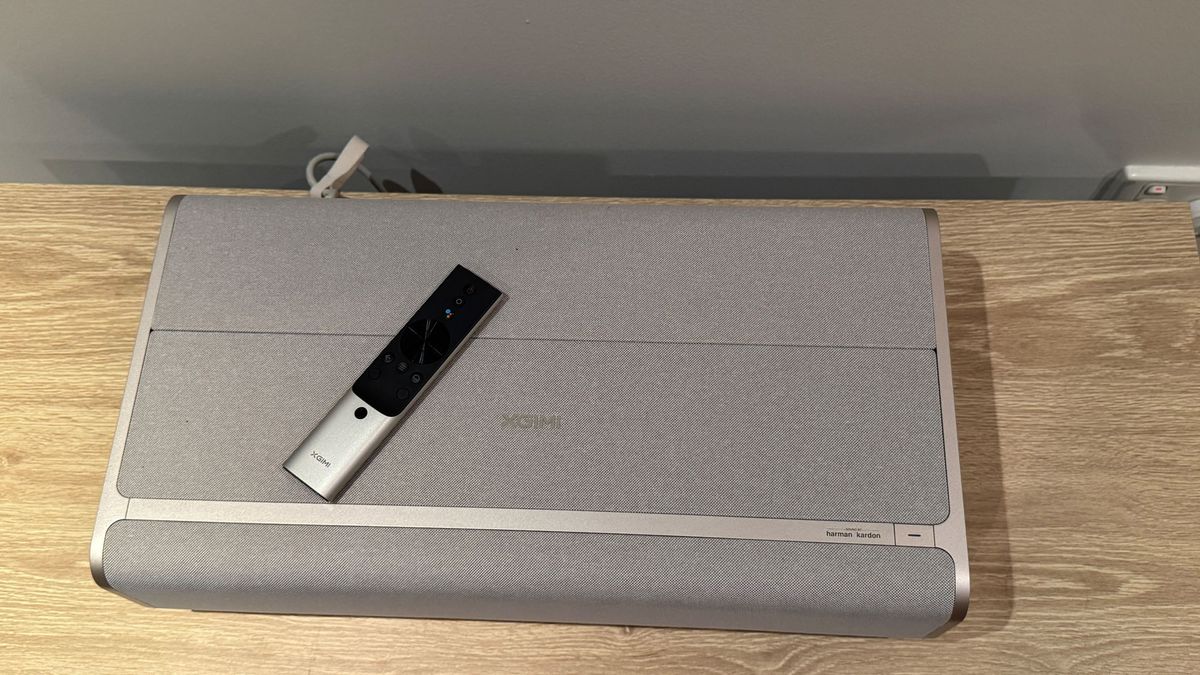Xgimi Aura 2: two-minute review
The Xgimi Aura 2 is a premium ultra short-throw (UST) 4K projector to come from the Chinese brand and is an update to 2021’s Aura. Like its predecessor, the Aura 2 aims to be a complete one-box solution for big-screen home theater thrills and, as such, is capable of projecting an image up to 150 inches in size.
Xgimi is touting its new Dual Light 2.0 technology – which combines laser and LED light sources – in the Aura 2 to deliver bright, colorful, contrast-rich images. On paper at least, there is a marked improvement compared to its predecessor – the Aura 2 is capable of reaching 2,300 ISO lumens of brightness compared to the Aura’s 1,800. Indeed, in practice, the Aura 2 is certainly bright enough for general viewing during the day, with a good level of depth and detail, serving up a wonderful cinematic image.
Naturally, when viewed in a darker room, the quality of the projected image improves and HDR content performs particularly well. The Xgimi Aura 2 supports Dolby Vision, HDR10, HLG and, following a firmware update since launch, IMAX Enhanced.
Achieving a well-calibrated picture on a wall or white screen is relatively simple thanks to the Aura 2’s wealth of picture adjustment settings, including automatic keystone correction and focus. And, should you need to take the reins and make finer manual adjustments, you can do so.
Despite a UST projector’s cinematic credentials, there is always going to be a case for getting one of the best TVs, especially where cost is concerned. The Xgimi Aura 2 is available now for $2,699 / £2,459 / AU$6,399. That’s only a few hundred more US dollars and UK pounds than the Aura, but over AU$2,000 more in Australia, which is a little puzzling. While in the US and UK it makes a competitive alternative to a 65- or 75-inch TV, for example, in Australia it’s a much tougher sell. Granted, the Aura 2 is capable of projecting an image far bigger than most TVs – and TVs that do encroach on 100-inches aren’t exactly cheap – but if you only have space to project an 80-inch image, then those in Australia may feel they’ll be better served by a TV.
The fact that the Xgimi Aura 2 uses the Android TV operating system rather than Google TV also feels like a bit of a missed opportunity, especially as some of the company’s other new projectors do use the latter. Because of its use of Android TV, it’s not the easiest process to get Netflix installed – although you can access it by first downloading a separate app from the Google Play Store – and I wasn’t able to get Disney Plus to install natively, instead resorting to connecting an Apple TV 4K to get my Pixar fix.
Speaking of connectivity, the Aura 2 has a wealth of inputs for connecting external devices, although some may feel doing so will ruin the otherwise clean aesthetic. An external soundbar can be connected too, although the built-in audio system is especially good, so you may not feel the need.
Despite a couple of setbacks, the Xgimi Aura 2 is a fantastic machine, although not without competition. Not only do companies such as Hisense and Samsung have excellent UST projectors of their own but, as already mentioned, home theater fans in certain countries may find greater value in a TV. But, if projection is the way you want to go, the Xgimi Aura 2 deserves an audition.
Xgimi Aura 2 review: Price & availability
- Available since September 2024
- List price: $2,699 / £2,459 / AU$6,399
The Xgimi Aura 2 was announced and officially launched at IFA Berlin on September 6, 2024. It’s available to buy now for $2,699 / £2,459 / AU$6,399.
Other recently released UST projectors such as the Hisense PX3-Pro, which has a higher ISO lumens brightness, costs $3,499 / £2,499 / AU$3,995 while the excellent Samsung Premiere 9 costs a lot more at $5,999 / £4,999. However, the Premiere 9 isn’t available in Australia at the time of writing. This means the Aura 2 is the most affordable of the three (except from in Australia) and, on paper at least, this is somewhat justified because it’s the lowest specced.
Xgimi Aura 2 review: Specs
| Screen sizes supported: | 80-150 inches |
| Brightness (specified) | 2300 ISO Lumens |
| HDR support: | Dolby Vision, HDR10, HLG, IMAX Enhanced |
| Optical technology: | Dual Light 2.0 |
| Smart TV platform: | Android TV |
| Connections: | 2x HDMI, 1x HDMI eARC, optical digital audio out, 3.5mm audio out, 3x USB-A, Ethernet |
| Dimensions: | 20 x 10.6 x 5.7 inches (51 x 27 x 14.4cm) |
| Weight: | 19.8 pounds (9kg) |
Xgimi Aura 2 review: Design and features
- Dual Light 2.0 laser light system
- Motorized top cover to protect against dust
- Android TV OS not the best
The Xgimi Aura 2 isn’t as projector-y looking as some of its competitors. On the contrary, it’s very much a lifestyle-oriented product designed to blend in with your home décor and not attract too much attention to itself. As such, it’s coated on all visible sides by a Moonlight Sand-colored fabric and has been given a treatment that claims to protect it against water, dust and oil (I didn’t have the confidence to test this out). In reality, it really is an attractive unit and could feasibly either go unnoticed in your room or at the very least be mistaken for a large Bluetooth speaker.
On the top you’ll find a motorized cover that slides open when the projector is powered on to reveal the laser light source. Not only is it a pretty cool party trick, but it helps keep the lasers and mirrors as free from dust and other debris as possible by hiding them away during downtime. There’s also an infrared detector that switches the laser off when it detects someone in its line of sight so you don’t damage your eyes, and yes, it really works.
Along the back (the side facing the wall) there are three HDMI inputs (two for connecting external devices and one that supports eARC if you want to connect an external soundbar or speaker system), three USB-A inputs and an ethernet port for a wired internet connection. Other outputs include a 3.5mm headphone jack and an optical audio port, plus Wi-Fi 6 and Bluetooth 5.2 are also supported.
The Xgimi Aura 2 uses the company’s own Dual Light 2.0 technology. This, says Xgimi, is a “wide spectrum and narrow spectrum hybrid light source technology” which “addresses issues related to traditional tri-color lasers such as speckles and color fringe, ensuring more comfortable viewing.” It’s also because of this light technology that the Aura 2 is able to use a 0.177:1 ultra-short throw ratio – meaning you can achieve a 100-inch image from a distance of just 17.8cm. Do note that this 17.8cm distance is between the projection surface and the closest side of the projector. You’ll still need to factor in the Aura 2’s 27cm depth when placing it on a bench or entertainment unit. Xgimi says for a 150-inch image, you’ll need a distance of 38.9cm.
Once in position, it’s a relatively pain-free process to get a properly aligned picture on a wall or projector screen. The Aura 2 has built-in auto keystone adjustment, which kicks into action whenever the projector itself is physically moved, or it can easily be run from within the settings menu. I have to admit that my first try of using this feature actually resulted in a completely jarring image that wasn’t aligned at all. I ran the setting again and it fixed it… mostly. I still had to use the manual image correction settings to quickly (and easily) align the four corners of the image within the confines of the viewing space on my wall.
The Aura 2 uses Android TV for its operating system, which is a strange choice considering this platform is all but dead on smart TVs and the projector version of the OS don’t necessarily get you access to all the streaming apps directly from the Google Play Store.
Xgimi acknowledges that Netflix doesn’t support projector systems running Android TV by way of a leaflet included in the box, which encourages you to download a separate app called Desktop Launcher. Doing so results in Netflix being able to be used, along with other apps such as Apple TV (which also can’t be found in the pre-installed Google Play Store).
Disney Plus was a notable omission entirely and in Australia where I’m based, 4K content on Stan wasn’t supported. I have a 4K subscription to the Australian streaming service which works without a hitch on my TV, but on the Aura 2 all content was available in HD quality only. The only workaround was to connect an Apple TV 4K to gain access to all my streaming apps, which was slightly disappointing.
That said, the UX will look familiar to anyone who’s previously used it or Google TV. A row of installed app icons is flanked above and below by recommended content and content you’re currently in the middle of watching. In use it was largely lag-free, with only the occasional stutter when trying to move quickly through rows or between menus.
The Xgimi Aura 2 comes with a remote control that’s surprisingly weighty, but which serves to provide a premium feeling. There aren’t many buttons, but I think this in turn makes it straightforward to understand and use. There are buttons for volume control, the home screen, settings, Google Assistant and a dedicated button for quick autofocusing. I did find myself pressing the Google Assistant button when I meant to select the settings, but I imagine this would become a non-issue with more use.
The remote isn’t backlit, which is a peculiar omission considering the projector is more likely to be used in low-light settings, and it’s powered by two AAA batteries. I would’ve preferred it if it were rechargeable via USB-C.
- Design & features score: 3.5/5
Xgimi Aura 2 review: Picture and sound quality
- Bright, colorful images
- Custom settings possible with various HDR content
- Built-in sound system is impressive
Due to space limitations in the room where I tested the Aura 2, I was only able to project an image roughly 80 inches in size onto a wall as opposed to a dedicated projection screen. Despite this, the Xgimi Aura 2 delivered a delightfully colorful, crisp image even during the daytime. Its brightness figure of 2300 ISO lumens might not match some of its closest competitors, such as the Hisense PX3-Pro or Samsung Premiere 9, but even in a room with sunlight filtering in, the image produced by the Aura 2 was easy to watch.
A Dolby Vision stream of Toy Story 4 on Disney Plus via an Apple TV 4K device exhibited excellent color reproduction, with the Aura 2’s 99% coverage of the DCI-P3 color gamut meaning greens, pinks, yellows and reds were all delivered with vibrancy. Getting the best picture settings for your personal preference, though, isn’t the easiest thing in the world.
When the Aura 2 detects Dolby Vision content it automatically switches to a default picture mode which doesn’t give much in the way of customization. You can switch between Dolby Vision Bright and Dark modes, with the former boosting the brightness a little, and you are able to set your own custom settings for things such as brightness and contrast, but there isn’t anything in the form of Filmmaker Mode, for example. Switch to non-Dolby Vision content, however, and you are able to cycle through a more familiar set of picture presets, including Movie, which I used whenever it was available.
Darker scenes in Toy Story 4, such as when Woody accidentally gets thrown out of the traveling RV at night revealed the Xgimi Aura 2 could handle subtle shadow details surprisingly well. As the famed cowboy is walking along the road at night, the rocky detailing of the tarmac road is easily seen, while grass and trees in dimmer lighting to the left are picked out as well.
While the majority of content projected by the Aura 2 includes the black bars above and below the central image – which can look a little too stretched out at times – because it is IMAX Enhanced, any content viewed in this format fills the entire projection surface. Shang-Chi and the Legend of the Ten Rings on Disney Plus is a good example, and one of the opening scenes featuring Ta Lo and Xu Wenwu in a lush green forest was another treat for the eyes. The fast-moving fight choreography was handled expertly and colors were clear and natural.
What was perhaps most surprising to me during my testing of the Xgimi Aura 2 was its audio performance. Xgimi has opted for a four-speaker Harman Kardon system with a combined output of 60 watts. With the projector and speakers sitting below the screen, it could have been all too easy for the sound output to feel low, but in actual fact voices clearly come from further above, resulting in a more immersive experience than I was expecting.
It can support Dolby Atmos, although I experienced more of a half-dome of sound as opposed to a full enveloping effect, which is to be expected to some degree due to there not being any physical rear speakers. But the Aura 2 can throw sound out wide with accurate object placement within the soundfield. Bass performance was also surprisingly good, with the Aura 2 projector capable of going real low. A little further on in Shang Chi, when the titular hero is fighting on a bus, is an engaging watch, with the backing soundtrack, punches, kicks and smashes all being fired out with genuine impact.
The Aura 2 does have an eARC output for connecting an external sound system, but I don’t think many people will feel the need to do so unless they want a more authentic Dolby Atmos experience.
- Picture & sound quality score: 4.5/5
Xgimi Aura 2 review: Value
- Competitively priced in the US and UK
- Expensive compared to other models in Australia
- Affordable big-screen TVs could be a better option
The Xgimi Aura 2 can be considered good value, but only depending on where you live. In the US and UK, it costs less than a well-specced big-screen TV such as an 83-inch LG C4 OLED. In Australia, however, it does still cost more for an 83-inch LG C4, but only by a few hundred dollars. Given the TV has a more feature-packed operating system, delivers true blacks and has a picture quality that’s less susceptible to bright rooms, it makes it a more compelling option purely from a value standpoint.
But, if it is a projector you’re seeking, the Xgimi Aura 2 definitely deserves an audition. It’s a great projector that delivers a colorful, clear image. It’s let down by its operating system, but if you don’t mind plugging an external media streamer into one of its HDMI inputs, then this becomes less of an issue.
Should I buy the Xgimi Aura 2?
| Row 0 – Cell 0 | Notes | Rating |
| Design & features | A gorgeous, compact package with great connectivity, but let down by a poor OS. | 3.5/5 |
| Picture & sound quality | Excellent color reproduction and bright enough to counter daytime lighting. A true cinema-like experience. | 4.5/5 |
| Value | Great value in some countries, not so great value in others. Consider a TV if you want big-screen thrills. | 4/5 |
Buy it if…
Don’t buy it if…
Also consider
| Header Cell – Column 0 | Xgimi Aura 2 | Hisense PX3-Pro | Samsung The Premiere 9 | Epson LS800 |
|---|---|---|---|---|
| Price: | $2,699 / £2,459 / AU$6,399 | $3,499 / £2,499 / AU$4,499 | $5,999 / £5,999 | $3,499 / £3,199 / AU$5,699 |
| Screen sizes supported: | 80 to 150 inches | 80 to 150 inches | 100 to 130 inches | Up to 150 inches |
| Brightness (specified): | 2,300 ISO lumens | 3,000 lumens | 3,450 ISO lumens | 4,000 lumes |
| HDR support: | HDR10, HLG, Dolby Vision | HDR10+, HDR10, HLG, Dolby Vision | HDR10+, HDR10, HLG | HDR10, HLG |
| Optical technology: | Dual Light 2.0 | 3-laser DLP | 3-laser DLP | 3LCD, laser light source |
| Smart TV: | Android TV | Google TV | Tizen | Android TV |
| Connections: | 2x HDMI, 1x HDMI eARC, optical digital audio out, 3.5mm audio out, 3x USB-A, Ethernet | 2x HDMI 2.1, 1x HDMI 2.0 (1 with eARC), optical, 3.5mm | x HDMI 2.0 (1 with eARC) , USB-A (powered), optical audio out, RS-232C, Ethernet | 3x HDMI 2.0 (1 with ARC) |
How I tested the Xgimi Aura 2
- Tested at home in various real-world living conditions
- Projected the image onto a white wall as opposed to a dedicated screen
- Watched a variety of content in SDR and HDR format
I tested the Xgimi Aura 2 at home over a period of about a month so I could experience it during various daytime living conditions. This meant multiple light sources, be it natural daylight or overhead lightbulbs, came into my testing room, at which point I rated the picture to see how well it performed.
The projector was tested against a white wall for the duration of my review, which also allowed me to test out its wall color adaptation and wall flatness modes. Both performed well and I could see noticeable differences before and after calibration.
I used a variety of content, including 4K HDR and standard full HD content from a variety of streaming services.
My testing evaluates the projector’s performance against other reviews my colleagues at TechRadar have conducted. I have been writing about and reviewing displays for five years.
Read more about how we test
[First published November 2024]
Read the full article here














